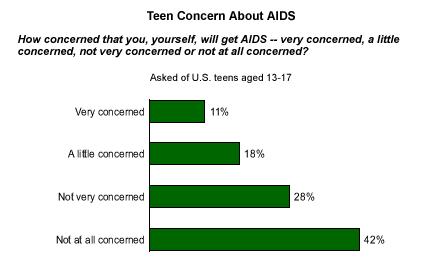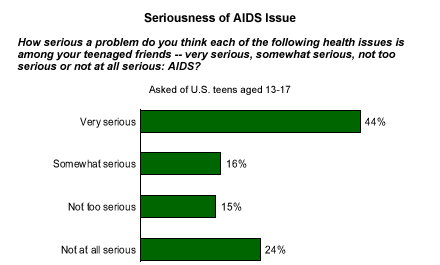Although it is no longer the ruthless epidemic in the United States that it is in other regions of the world, AIDS remains a worrisome threat. Although much of the research on AIDS-related perceptions and behavior focuses on adults, AIDS -- still deadly despite several decades of work toward a cure -- is a concern for many American youth as well.
According to a new Gallup Youth Survey of 13- to 17-year-olds*, conducted between Jan. 22 and March 9, 15% of teens say they think AIDS or HIV is the most urgent health problem facing the United States, ranking with cancer (14%) and obesity (12%) as the most common responses. When asked about their level of concern with a variety of health issues, 11% of teens claim to be "very concerned" about getting AIDS, with another 18% saying they are "a little concerned."

While the majority of teenagers express little or no concern about getting AIDS, it is significant that nearly 3 in 10 feel at least a little concerned, considering the fact that AIDS in America is a much lower-profile issue today than it was a decade ago. The survey also indicates that 44% of teens feel that the issue of AIDS is a "very serious" problem among their teenaged friends, and another 16% feel that it is a "somewhat serious" problem. The remaining 39% characterize AIDS as "not too serious" or "not at all serious" as a health issue among their teenaged friends.

Data from the U.S. Centers for Disease Control and Prevention (CDC), which extensively tracks and monitors AIDS/HIV infection in the United States, show that there were more than 35,000 estimated cases of AIDS in 2003 among Americans between the ages of 13 and 24. Although HIV deaths have declined since 1995, HIV was still the fifth-leading cause of death among people aged 25 to 44 in 2002.
Although the prevalence of AIDS is relatively low among 13- to 17-year-olds, teens' opportunities to contract the disease will be higher in their late teens and early 20s, as sexual activity in their peer group increases. And because awareness and communication are important to the prevention of HIV/AIDS, teens' concerns about contracting AIDS and their perceptions of AIDS as a serious problem among their friends can be viewed as a positive indicator in the fight to prevent the spread of the disease.
Demographics
There are few demographic differences in teens' levels of concern about contracting AIDS, but there are some interesting differences by race and ethnicity and by the region of the country that teens live in. Nonwhite teens are far more likely to say that they are very or a little concerned about contracting AIDS than white teens are: 44% of nonwhite teens are concerned, compared with only 21% of white teens. Those living in the Midwest are less likely than those in other parts of the nation to be very or a little concerned about getting AIDS (19% of teens in the Midwest, compared with 34% of those in the Northeast, 30% of Southerners, and 34% of those in the West).
Differences also emerge on the question about teen concern regarding the seriousness of AIDS as a health issue among their teenaged friends. Fifty-eight percent of nonwhite teens say that AIDS is a very serious health problem among their friends, compared with 36% of white teens who classify the problem the same way. The level of perceived seriousness increases with age: 38% of teens between the ages of 13 and 15 say AIDS is a very serious health issue among their friends, compared with 52% of teens aged 16 to 17.
Bottom Line
The CDC has observed that communication between young people and their parents about sex and sexually transmitted diseases is important to preventing the spread of HIV. School programs are also an important link in helping to establish healthy behaviors in young people. According to a CDC report, "research has clearly shown that the most effective programs are comprehensive ones that include a focus on delaying sexual behavior and that provide information on how sexually active young people can protect themselves."
Gallup's survey data suggest that teens may be getting the message about the risk of AIDS. A relatively small percentage of teens are concerned about contracting AIDS themselves, which may suggest that most teens are protecting themselves against it by avoiding unprotected sex and other risky behaviors. At the same time, a majority of teens are aware of the fact that AIDS is a threat to their friends. However, it remains to be seen whether the levels of concern reflected in these data will translate into behaviors that will further limit the spread of HIV among the nation's teens and young adults in the years to come.
*The Gallup Youth Survey is conducted via an Internet methodology provided by Knowledge Networks, using an online research panel that is designed to be representative of the entire U.S. population. The current questionnaire was completed by 785 respondents, aged 13 to 17, between Jan. 22 and March 9, 2004. For results based on the total sample, one can say with 95% confidence that the maximum margin of sampling error is ±4 percentage points.